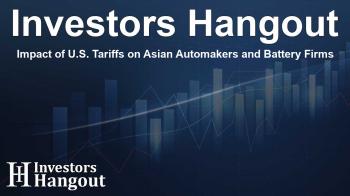Impact of U.S. Tariffs on Asian Automakers and Battery Firms

Impact of Recent U.S. Tariffs on Asian Automakers
In recent developments, shares of Japanese automakers and South Korean battery manufacturers took a significant hit following remarks by U.S. President Donald Trump regarding potential tariffs on imported vehicles from Canada and Mexico. The announcement came as part of a broader initiative that reflects the U.S. administration's changing trade policies.
Overview of the Automotive Landscape
The automotive industry is currently facing a transformation, shifting towards electric vehicles. This evolution is compounded by the growing competition posed by Chinese automotive firms, which has intensified the challenges for established manufacturers in Japan and South Korea. The U.S. market is critical for these manufacturers, generating substantial revenue from exports. Trump's comments about imposing a 25% tariff are thus particularly concerning for companies reliant on exporting vehicles from these nations.
Nissan's Response to Potential Tariffs
Nissan Motor Corporation, Japan's third-largest auto manufacturer, experienced a noticeable decline in their stock prices, falling 0.3% after losing earlier gains. The company operates two plants in Mexico that produce models such as the Sentra, Versa, and Kicks, targeting the U.S. market. The Chief Executive, Makoto Uchida, has emphasized that about 300,000 vehicles are exported to the U.S. annually, which underscores the potential impact of tariffs on operations.
Honda's Production Challenges
Similarly, Honda Motor operates with a heavy reliance on producing vehicles for the U.S. market. Approximately 80% of Honda's output from Mexico is directed towards the U.S., prompting worries among executives. Chief Operating Officer Shinji Aoyama raised the possibility of reconsidering production locations should permanent tariffs on imported vehicles be instituted. The ramifications are significant for the company's profitability and operational strategies.
Stock Market Reactions
The market reacted swiftly to these announcements, with Honda shares following Nissan's lead, reversing earlier gains and also falling by 0.3%. Initially, Honda's shares had posted a higher opening but succumbed to the pressure of looming tariffs. This reflects a broader concern among investors about how both companies will navigate the evolving landscape of U.S. trade policies.
Responses from Government Officials
The Japanese government's response has been measured, with Finance Minister Katsunobu Kato indicating that Japan would examine Trump's policies carefully and respond appropriately to safeguard its interests. Given the importance of North America to Japanese automakers, this situation is being monitored closely.
Battery Manufacturers Under Pressure
The pressures extend beyond automakers to include battery manufacturers in South Korea. Companies like LG Energy Solution and Samsung SDI reported losses in their stock values, with LG decreasing by 5%. Furthermore, both Samsung SDI and SK Innovation saw declines exceeding 4%. The implications of U.S. tariffs could disrupt their market strategies as well.
Conclusion on the Current Situation
The ripple effects of these tariff threats showcase the vulnerabilities of the automotive and battery manufacturing sectors in Asia. As these companies respond to both regulatory changes and the pressures of competition, their strategies will be crucial in maintaining market stability and growth in an increasingly challenging environment.
Frequently Asked Questions
What are the potential impacts of U.S. tariffs on Asian automakers?
U.S. tariffs could significantly raise production costs for Asian automakers and lead to reduced profit margins.
How does Trump’s tariff announcement affect Nissan?
Nissan may face production and financial challenges due to potential tariffs on vehicles manufactured in Mexico for export to the U.S.
What is Honda's strategy in response to the tariff threat?
Honda is considering shifting production locations to mitigate the impact of potential permanent tariffs on imported vehicles.
Which South Korean companies are affected by the tariffs?
Major battery manufacturers such as LG Energy Solution, Samsung SDI, and SK Innovation are facing stock declines due to tariff uncertainties.
How is the Japanese government responding to U.S. policy changes?
The Japanese government plans to carefully assess U.S. policies and respond appropriately to protect its automotive industry.
About The Author
Contact Henry Turner privately here. Or send an email with ATTN: Henry Turner as the subject to contact@investorshangout.com.
About Investors Hangout
Investors Hangout is a leading online stock forum for financial discussion and learning, offering a wide range of free tools and resources. It draws in traders of all levels, who exchange market knowledge, investigate trading tactics, and keep an eye on industry developments in real time. Featuring financial articles, stock message boards, quotes, charts, company profiles, and live news updates. Through cooperative learning and a wealth of informational resources, it helps users from novices creating their first portfolios to experts honing their techniques. Join Investors Hangout today: https://investorshangout.com/
The content of this article is based on factual, publicly available information and does not represent legal, financial, or investment advice. Investors Hangout does not offer financial advice, and the author is not a licensed financial advisor. Consult a qualified advisor before making any financial or investment decisions based on this article. This article should not be considered advice to purchase, sell, or hold any securities or other investments. If any of the material provided here is inaccurate, please contact us for corrections.

